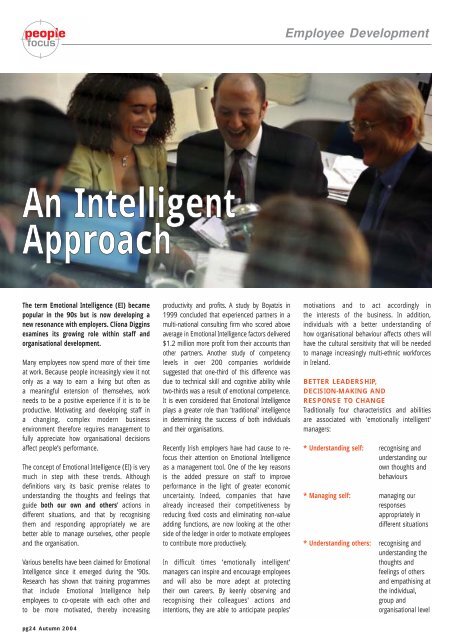People Focus Spring 04 NA - CIPD
People Focus Spring 04 NA - CIPD
People Focus Spring 04 NA - CIPD
- No tags were found...
Create successful ePaper yourself
Turn your PDF publications into a flip-book with our unique Google optimized e-Paper software.
Employee DevelopmentAn IntelligentApproachThe term Emotional Intelligence (EI) becamepopular in the 90s but is now developing anew resonance with employers. Clíona Digginsexamines its growing role within staff andorganisational development.Many employees now spend more of their timeat work. Because people increasingly view it notonly as a way to earn a living but often asa meaningful extension of themselves, workneeds to be a positive experience if it is to beproductive. Motivating and developing staff ina changing, complex modern businessenvironment therefore requires management tofully appreciate how organisational decisionsaffect people’s performance.The concept of Emotional Intelligence (EI) is verymuch in step with these trends. Althoughdefinitions vary, its basic premise relates tounderstanding the thoughts and feelings thatguide both our own and others’ actions indifferent situations, and that by recognisingthem and responding appropriately we arebetter able to manage ourselves, other peopleand the organisation.Various benefits have been claimed for EmotionalIntelligence since it emerged during the ‘90s.Research has shown that training programmesthat include Emotional Intelligence helpemployees to co-operate with each other andto be more motivated, thereby increasingproductivity and profits. A study by Boyatzis in1999 concluded that experienced partners in amulti-national consulting firm who scored aboveaverage in Emotional Intelligence factors delivered$1.2 million more profit from their accounts thanother partners. Another study of competencylevels in over 200 companies worldwidesuggested that one-third of this difference wasdue to technical skill and cognitive ability whiletwo-thirds was a result of emotional competence.It is even considered that Emotional Intelligenceplays a greater role than 'traditional' intelligencein determining the success of both individualsand their organisations.Recently Irish employers have had cause to refocustheir attention on Emotional Intelligenceas a management tool. One of the key reasonsis the added pressure on staff to improveperformance in the light of greater economicuncertainty. Indeed, companies that havealready increased their competitiveness byreducing fixed costs and eliminating non-valueadding functions, are now looking at the otherside of the ledger in order to motivate employeesto contribute more productively.In difficult times ‘emotionally intelligent’managers can inspire and encourage employeesand will also be more adept at protectingtheir own careers. By keenly observing andrecognising their colleagues' actions andintentions, they are able to anticipate peoples’motivations and to act accordingly inthe interests of the business. In addition,individuals with a better understanding ofhow organisational behaviour affects others willhave the cultural sensitivity that will be neededto manage increasingly multi-ethnic workforcesin Ireland.BETTER LEADERSHIP,DECISION-MAKING ANDRESPONSE TO CHANGETraditionally four characteristics and abilitiesare associated with 'emotionally intelligent'managers:* Understanding self: recognising andunderstanding ourown thoughts andbehaviours* Managing self: managing ourresponsesappropriately indifferent situations* Understanding others: recognising andunderstanding thethoughts andfeelings of othersand empathising atthe individual,group andorganisational levelpg24 Autumn 20<strong>04</strong>
















